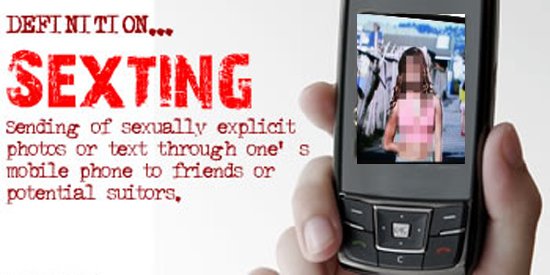Coronavirus and school closures can mean that children spend more time online and use more social media apps or sites to chat with friends or others online.
According to new polls, young people who frequently chat with their friends online also post nude content.

What is Sexting and Sending Naked Content?
Sexting and sending nude content is when someone shares a sexual message, a naked or half-naked image, a video or an obscene message with another person. It does not have to be a nude image of themselves but it could be someone else's image.

What are the risks of Sexting?
It is important to talk to child about the dangers of sexting and let them know that someone might come along who will pressure you to send or share nude content with them. Some of the dangers of sexting or sending and sharing nudes for children and young people are:
- Losing control of images, videos or messages and how they are shared. Once something is shared online, it is public and can be saved or copied by others.
- Blackmail, intimidation and physical harm. Young people can share the photos, the messages or their videos without their consent or to intimidate them. This can lead to bad feelings such as anxiety or embarrassment and shame.

Support your child if he / she has done it Sexting
If your child sends, shares or receives sexual messages, photos or videos, you may feel upset, angry or confused. It is natural to feel this. Your children may also feel anxious to talk about what happened, but there are ways you can reassure them.
-
- Trying not to yell at them, or make them feel it is their fault. They may be worried and need your help and advice.
- Reassuring and supportive - remind them that they can always talk to you, another trusted adult or Childline.
- Ask open-ended questions like "what happened?" instead of asking "why did you do it", as this may prevent them from opening up to you.
- Talk to them about how to behave with others on the Internet, what is the appropriate online behavior
- Reminding them that people may not always be what they say, so they should be careful when talking to someone they do not know
- Schools can monitor the situation of children and prevent the sharing of images or videos. They can also support any other affected children by having a counseling service where children can talk about their concerns.
- Explore the social networks, applications and games that children use.

Report sexual image or video
Some of the ways in which you can report a sexual image or video are:
- Contact CEOP if you are worried about a child sending naked pictures, videos or sex messages.
- Report the image to Internet Monitoring Foundation (IWF). Your child may need a copy of his / her ID to confirm that he / she is under 18 years old.
- Make a report on the social media platform where the image or video is shared. use it Net Aware to learn how to do this on different social networks, apps and games.

Is sexting legal?
The law states that the creation or sharing of sexual images or videos of a child under the age of 18 is illegal, even if the person making it is a child. This includes:
-
- Sending sexual messages to a child
- A child taking a clear photo or video of himself or a friend
- Share a picture or video of a child, even if shared with children of the same age
- Already have, download or save a picture or video of a child, even if the child has given permission to download.
- Sharing a picture or video of a child is illegal, even if shared with children of the same age. It is also illegal to share a photo of a child for awareness.
If sexting is reported to the police, it creates a report but can not take formal action against a young person. You can talk to them if you are unsure or worried.





